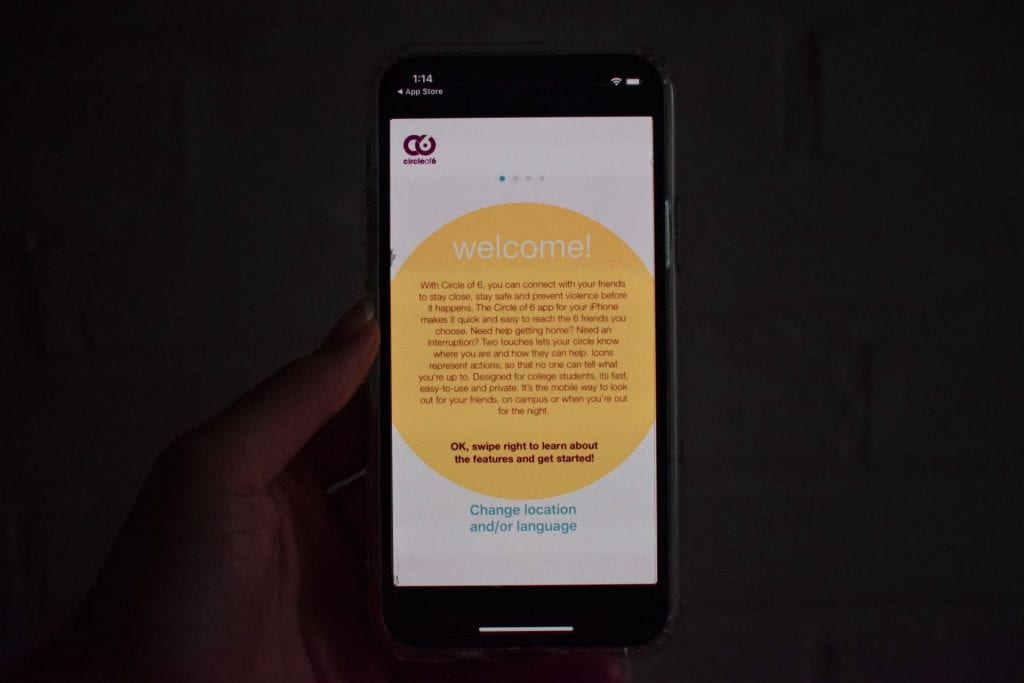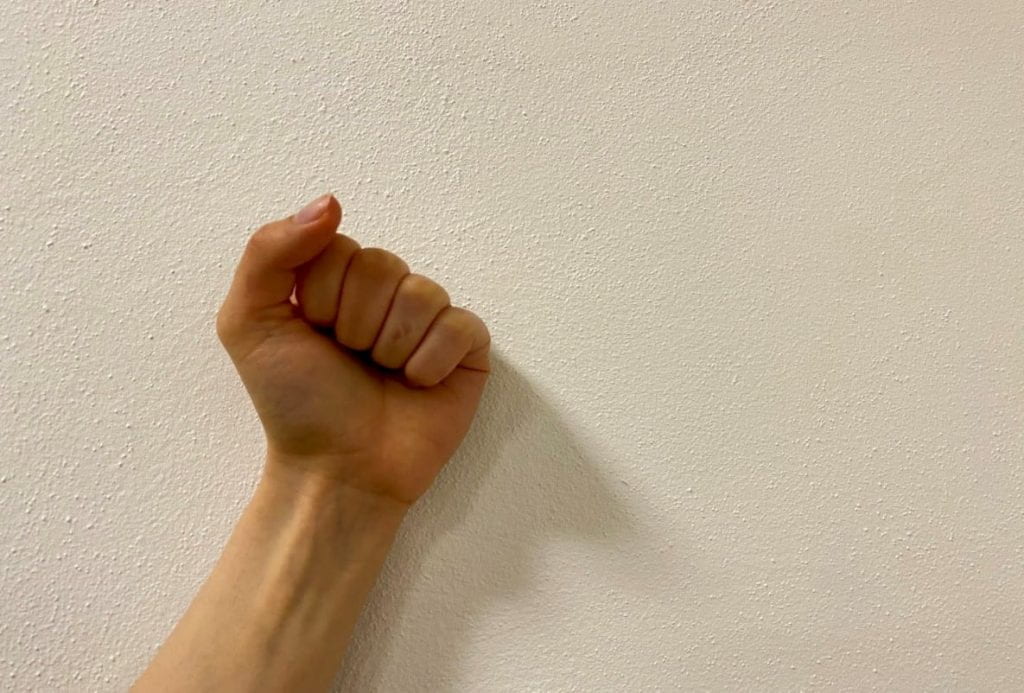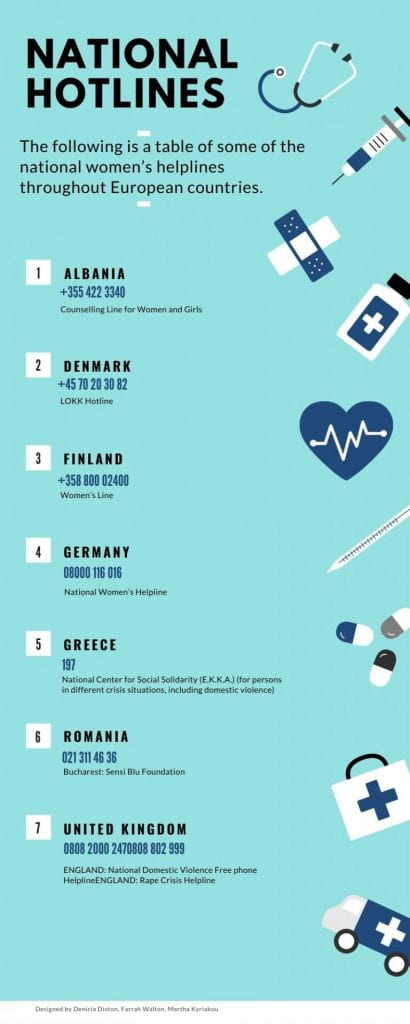Although the COVID-19 lockdown is a challenging time for every nation, domestic abuse victims all over the world find themselves in troubled situations. Europe has constructed new procedures and helpful solutions to give victims the support they need.
By Martha Kyriakou | Farrah Walton | and Denicia Dixon
Since Europe declared the COVID-19 lockdown in early March, the number of domestic violence cases increased by a third throughout the EU nation, according to the European Parliament.
With victims being forced to spend more time with their abusers in isolation, the escalation of domestic violence cases was expected, according to Henriette Winther, the senior communication advisor of Danner Women Shelter in Copenhagen, Denmark.
“The rise in the cases is actually developing the way we predicted, we are not surprised it is going this direction,” said Winther.
Victims are facing multiple problems since the COVID-19 lockdown has been initiated. Not only are they in mandatory home confinement with their abuser, but they do not have a safe space to alert others that they are in need of help.

The many complications that the pandemic brought upon the EU can bring an increase of tension and stress to the home of the victims. Abusers can be more sensitive and triggered by unusual things that can further lead to violence towards victims. This can have a deeper impact on their mental health causing them to think that there is no way out of this horrific lockdown.
The Istanbul Convention
In May 2011, the Council of Europe created The Istanbul Convention. This human rights treaty sets out legal standards for the prevention of violence against women, protection and support to victims. The standards of the treaty explain in detail how victims should be protected and supported. It contains an annex with concrete examples on how all forms of violence against women should be protected.
Since European nations have reported a surge in the number of domestic abuse cases, all state parties were called to uphold the standards of the Istanbul Convention.
“In additon, all member states were asked to submit information on national actions taken to ensure women’s protection from violence during the pandemic and other measures in the area of women’s rights,”said Johanna Nelles, head, violence against women exective secretary of the Istanbul Convention monitoring mechanism (GREVIO and committee of the parties).
European Parliament takes action
The European Parliament agreed to raise the funding that is given to NGOs in the domestic violence sector and to make help quickly available, according to the FEMM Committee.
David Sassoli, President of the European Parliament, opened a new building to give shelter to 800 women. Also, multiple MEPs including MEP Regner, agree that any measure, no matter how small, matters when it comes to the safety of domestic abuse victims.
The members of the European Parliament are making it a priority for each member state to follow the Istanbul Convention and take action to support the domestic violence victims.
“Especially now it has become more than visible that Member States could and should do more to end all forms of violence against women,” said Evelyn Regner, Member of the European Parliament, Chair of the FEMM-Committee.
European Justice supports domestic violence victims
The European Justice system has been impacted significantly by the effects of COVID-19. The European Union has made alterations to specific laws due to the pandemic to help the public receive proper justice.
Usually, there is a time limit on when civilians need to file a report on a civil dispute but the virus has affected the procedural time limits on certain cases.
“It is clear that the COVID-19 crisis creates an exceptional situation which presents significant challenges for citizens and authorities alike, and may create situations where respecting the obligations set out by Union law is temporarily not possible, or is excessively difficult,” according to the official European Justice website.
The COVID-19 quarantine makes it difficult for domestic violence victims to obtain the legal advisory and evidence in a timely matter to dispute a case. This new alteration to the law of time limits will allow the victims to file and prove their case when it is a more convenient time.
Every Nation has different but effective methods
“For the victims themselves it is indeed difficult to contact someone for help. Measures like apps, messengers, helplines and code words in pharmacies or shops can also be a good alternative for women to get help. A combination probably is the best way,” stated Regner.
There is always room for improvement and more that can be done when it comes to the safety of the victims. Every country is handling this situation in their own way, some better than others and some leading by example. The member states are adapting to the drastic measures COVID-19 has brought upon the EU by developing new methods that will support the increase of domestic violence cases.
Spain, and France, started the movement of using code words at pharmacies for victims to notify workers that they need help, according to Regner. Germany, Norway, and Italy joined the movement making this method more common around Europe.
Italy created a domestic abuse alert app that allows women to contact helplines in a secretive way. This has caused the amount of calls to rise by 75% since April.

In Paris, women’s support association, Dù Côté des Femmes, made a vacant student housing building available to victims of domestic abuse until July 2020, according to Voa News. The association provided legal and psychological counseling to the victims.
Other countries have made it accessible for surrounding citizens to contact help if witnessing a case of violence.
“Portugal, started a public campaign to avert citizens to listen and call the police when they hear violence in neighboring apartments/houses,” according to Regner.
Future hope for victims
With some member states slowly reopening and entering “phase number two” of returning back to normal, this is giving domestic violence victims a chance to contact help.
“Last week when Denmark started phase number two, which is the reopening of the society, we have seen a rise in the calls from victims again because they have an excuse to get away from home,” said Winther of Danner women shelter.
As of 4 May 2020, Italy, Europe’s country that has been on the longest COVID-19 lockdown, is entering phase number two. Once more countries start to slowly reopen this will provide all victims a sense of relief to finally find the opportunity to get the help they need.
If you or someone you know is a domestic violence victim, please reach out for help. You can call the Europe emergency telephone 112, if you are in immediate danger.


Awareness video for the rise of domestic violence in Europe during COVID-19 lockdown: https://www.youtube.com/watch?v=WycRmH4Ny5E&t=2s